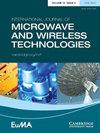Ultrahigh frequency path loss prediction based on K-nearest neighbors
IF 1.4
4区 计算机科学
Q3 ENGINEERING, ELECTRICAL & ELECTRONIC
International Journal of Microwave and Wireless Technologies
Pub Date : 2024-05-22
DOI:10.1017/s1759078724000370
引用次数: 0
Abstract
Path loss prediction (PLP) is an important feature of wireless communications because it allows a receiver to anticipate the signal strength that will be received from a transmitter at a given distance. The PLP is done by using machine learning models that take into account numerous aspects such as the frequency of the signal, the surroundings, and the type of antenna. Various machine learning methods are used to anticipate path loss propagation but it is difficult to predict path loss in unknown propagation conditions. In existing models rely on incomplete or outdated data, which can affect the accuracy and reliability of predictions and they do not take into account the effects of environmental factors, such as terrain, foliage, and weather conditions, on path loss. Furthermore, existing models are not robust enough to handle the real-world variability and uncertainty, leading to significant errors in predictions. To tackle this issue, a novel ultrahigh frequency (UHF) PLP based on K-nearest neighbors (KNNs) is developed for predicting and optimizing the path loss for UHF. In this proposed model, a KNN-based PLP has been used to predict the path loss in the UHF. This technique is used for high-accuracy PLP through KNN forecast route loss by determining the K-nearest data points to a particular test point based on a distance metric. Moreover, the existing models were not able to optimize path loss due to complex and large-scale machine learning models. Therefore, the stochastic gradient descent technique has been used to minimize the objective function, which is often a measure of the difference between the model’s predictions and the actual output that will fine-tune the parameters of the KNN model, by measuring the similarity between data points. This model is implemented using Python to make it a lot more convenient.基于 K 最近邻的超高频路径损耗预测
路径损耗预测(PLP)是无线通信的一项重要功能,因为它允许接收器预测在给定距离内从发射器接收到的信号强度。路径损耗预测是通过使用机器学习模型来完成的,这些模型考虑了信号频率、周围环境和天线类型等多个方面。各种机器学习方法用于预测路径损耗传播,但很难预测未知传播条件下的路径损耗。现有模型依赖于不完整或过时的数据,这会影响预测的准确性和可靠性,而且这些模型没有考虑地形、树叶和天气条件等环境因素对路径损耗的影响。此外,现有模型的鲁棒性不足以处理现实世界中的可变性和不确定性,从而导致预测出现重大误差。为解决这一问题,我们开发了一种基于 K 近邻(KNN)的新型超高频(UHF)PLP,用于预测和优化超高频的路径损耗。在这一拟议模型中,基于 KNN 的 PLP 被用于预测超高频的路径损耗。该技术通过 KNN 预测路径损耗,根据距离度量确定距离特定测试点最近的 K 个数据点,从而实现高精度 PLP。此外,由于复杂的大规模机器学习模型,现有模型无法优化路径损耗。因此,我们采用了随机梯度下降技术,通过测量数据点之间的相似性来最小化目标函数,而目标函数通常是模型预测与实际输出之间差异的度量,它将微调 KNN 模型的参数。该模型使用 Python 实现,因此更加方便。
本文章由计算机程序翻译,如有差异,请以英文原文为准。
求助全文
约1分钟内获得全文
求助全文
来源期刊

International Journal of Microwave and Wireless Technologies
ENGINEERING, ELECTRICAL & ELECTRONIC-TELECOMMUNICATIONS
CiteScore
3.50
自引率
7.10%
发文量
130
审稿时长
6-12 weeks
期刊介绍:
The prime objective of the International Journal of Microwave and Wireless Technologies is to enhance the communication between microwave engineers throughout the world. It is therefore interdisciplinary and application oriented, providing a platform for the microwave industry. Coverage includes: applied electromagnetic field theory (antennas, transmission lines and waveguides), components (passive structures and semiconductor device technologies), analogue and mixed-signal circuits, systems, optical-microwave interactions, electromagnetic compatibility, industrial applications, biological effects and medical applications.
 求助内容:
求助内容: 应助结果提醒方式:
应助结果提醒方式:


